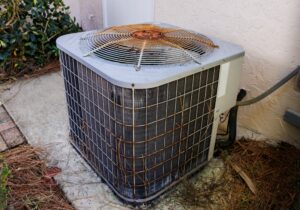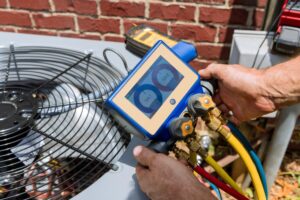Are you considering installing a new heating system in your Wisconsin home? When it comes to keeping living spaces warm and cozy during those chilly Midwest winters, one of the most popular options is a furnace — and for a good reason (which we’ll get into shortly)! Of course, it’s not the only option for heating a home, and many compare it to a boiler system. But what exactly is the difference between a boiler vs. a furnace? Is one better suited for your home than the other? In this blog, we’ll dive into all the details to help you make an informed decision about your heating needs.
What Is a Furnace?
A furnace is a forced-air heating system that warms air and then distributes it throughout your home via ductwork. A fuel source, such as natural gas, propane, oil, or electricity, heats the air, and then a fan or blower pushes the air through ducts and out of vents into different rooms. Due to its reliability and ease of maintenance, the furnace is the most common type of heating system in the United States.
What Is a Boiler?
Unlike a furnace, which heats air directly, a boiler heats water and then circulates it through pipes to radiators or baseboard heaters in each room. This method of heating is often referred to as “hydronic” heating. Once the water cools, it returns to the boiler to be heated again, creating a continuous cycle of heat distribution. Boilers can use various fuel sources, including natural gas, oil, or electricity, to heat the water.
Boilers vs. Furnaces: An In-Depth Comparison
Now that you know how each type of heating system works, let’s look at how they stack up against each other in different categories:
Energy Efficiency
Both boilers and furnaces can be energy-efficient, but when comparing furnace vs. boiler efficiency, boilers tend to have the edge. Why? Well, boilers use water to transport heat, and water is a better conductor than air, so it requires less energy to distribute heat throughout a space.
With that said, furnaces are still highly efficient, coming in close behind boilers. Modern high-efficiency furnaces can achieve AFUE (Annual Fuel Utilization Efficiency) ratings of up to 98%, meaning they convert 98% of their fuel into heat. These heating systems also allow for easy zoning, which means you can heat different areas of your home to different temperatures. This can lead to significant energy savings by not overheating rarely used spaces.
Installation and Maintenance
When it comes to installation, furnaces typically have the advantage. A furnace installation is usually easier and less expensive, especially in homes that already have ductwork. Boilers, on the other hand, require a network of pipes, which can be more complex and costly to install, particularly in existing homes.
Maintenance is a bit of a toss-up. Furnaces require regular filter changes, which is an easy DIY task for most homeowners. They also benefit from annual professional check-ups. Boilers generally need less frequent maintenance, but when they do need service, it can be more complex and potentially more expensive.
Heating Speed
Furnaces provide warm air almost immediately after the system kicks on, making them an excellent choice for those who want a fast response to temperature changes. Boilers, in contrast, are not as quick to respond to sudden temperature changes. With one of these units, you could end up having to wait an extended period of time before your home reaches the ideal temperature if a cold front blows in.
Comfort and Air Quality
Here’s where things get interesting! Boilers are often praised for providing consistent, even heat throughout the home. They don’t blow air around, which some people find more comfortable.
However, furnaces have made significant strides in this area. Modern variable-speed furnaces can provide very consistent temperatures and are much quieter than their predecessors. Plus, furnaces have a secret weapon in the comfort battle: they can be easily paired with whole-home humidifiers and air purifiers. This means that while they’re heating your home, they can also be improving your air quality, reducing static electricity, and even helping to preserve your wood furniture and floors.
Lifespan and Reliability
Both systems can last a long time with proper maintenance. Boilers often have a slight edge in lifespan, potentially lasting 20-30 years. Furnaces typically last 15-20 years, but this can be extended with regular maintenance.
In terms of reliability, both systems are generally quite dependable. However, furnaces have fewer components that can fail, which can make them slightly more reliable in the long run.
Cost Considerations
Initial costs can vary widely depending on your home and the specific models you choose. Generally, furnaces have a lower upfront cost, especially if your home already has ductwork.
Operating costs will depend on fuel prices in your area and the efficiency of your system. High-efficiency furnaces can often provide lower monthly heating bills, especially when paired with smart thermostats and proper zoning.
Contact Our Experts to Make the Right Choice for Your Home
So, which is better — a furnace or a boiler? While both systems have their merits, furnaces often come out on top for many homeowners. Their energy efficiency, versatility, ease of installation, and ability to integrate with air quality improvements make them an excellent choice for many homes.
At H.J. Faust, Inc., we’re here to help you make the best decision for your home. We can assess your specific needs, consider your home’s layout, and help you choose the perfect heating system. Contact our team today for high-quality furnace services that will keep your living space comfortable all winter long.



